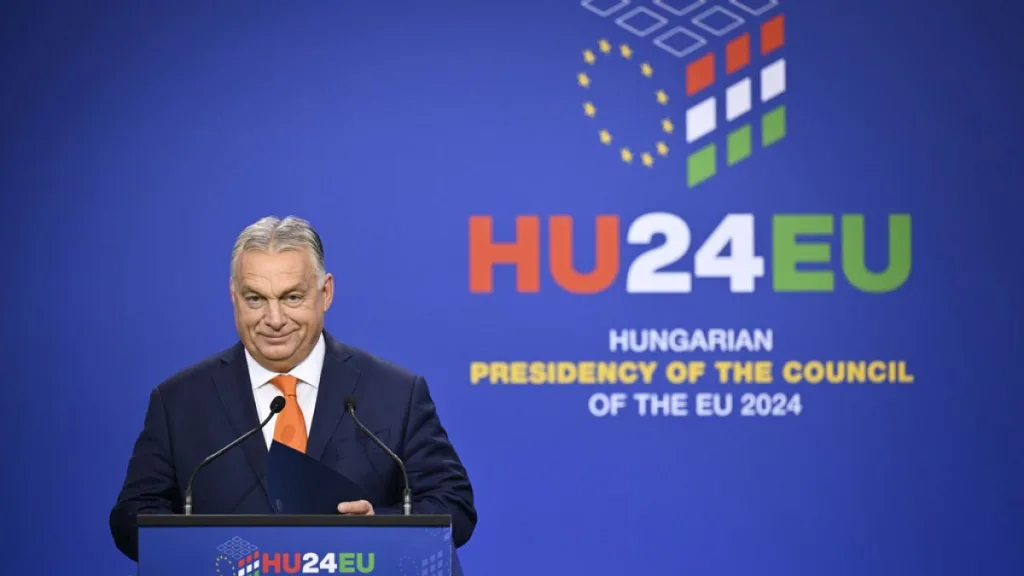In the European Parliament, the three most prominent right-wing groups are often labeled as “far-right,” yet they possess significant distinctions that set them apart.
Members of the Patriots for Europe convened in Brussels for the first time on Thursday, gathering during the European summit.
This group stands alongside Europe of Sovereign Nations (ESN) and the European Conservatives and Reformists (ECR) as one of the three right-leaning factions in the Parliament.
Generally characterized by their nationalist, sovereigntist, conservative, and Eurosceptic views, these parties exhibit varying stances on issues concerning Russia, Ukraine, and their precise relationships with the European Union.
Despite their collective categorization as far-right, many members vehemently reject this label.
Terms like extreme right, hard right, radical right, national conservative, and populist have permeated European discourse, leading to increasingly blurred definitions. But where do the real differences lie?
Euronews consulted an expert to help clarify these classifications.
Extremist, Illiberal, and Nativist
Dave Sinardet, a Political Science professor at the Free University of Brussels, asserts, “The Europe of Sovereign Nations is the most extreme far-right group in the European Parliament.”
Established in July, it is the newest and smallest parliamentary bloc, with the notorious Alternative for Germany comprising more than half of its 25 members. It also includes the Polish Confederation and Bulgarian MEPs from the pro-Russian party Renaissance.
According to Sinardet, several of these parties can justifiably be labeled as extremist, implying a disregard for parliamentary democracy and the presence of authoritarian traits.
The professor describes this group as illiberal, indicating difficulties in accepting judicial independence, the rule of law, and individual liberties. Their nativist ideologies highlight opposition to immigration and a preference for native-born citizens over immigrants.
“Parties that are distinctly illiberal and nativist are primarily found within the Europe of Sovereign Nations,” Sinardet explains, “with some from Patriots for Europe also fitting the illiberal category.”
Populism Over Demagogy
With 86 MEPs, Patriots for Europe ranks as the third-largest faction in the European Parliament.
Established in July, this coalition features prominent right-wing figures including Marine Le Pen’s Rassemblement National from France, Viktor Orbán’s Fidesz from Hungary, and Matteo Salvini’s League from Italy, along with Spain’s Santiago Abascal’s Vox party and Herbert Kickl’s FPÖ from Austria.
Both Patriots for Europe and Europe of Sovereign Nations can also be classified as populist, according to Sinardet.
Often mistaken for demagogy, populism encapsulates a simplistic worldview, contrasting a corrupt elite against “the people,” perceived as a homogeneous group.
It is important to note that populism can exist on both ends of the political spectrum; for instance, the strongly leftist La France Insoumise is widely recognized as a populist party as well.
Defining Radicalism
Lastly, certain factions within the European Conservatives and Reformists (ECR) are often labeled as “radical right,” distinguishing them from other far-right parties.
Comprising 78 MEPs, this group centers around Giorgia Meloni’s Brothers of Italy and Jarosław Kaczyński’s Law and Justice party from Poland.
According to political scholar Cas Mudde, the term “radical right” refers to parties that merge two ideologies: nativism and authoritarianism, applying a strong emphasis on adherence to authority.
Sinardet adds, “Not all European conservative and reformist parties fit the radical right definition. Some lean more towards nationalism and conservatism, while others are clearly radical right-wing.”
Photo credit & article inspired by: Euronews



